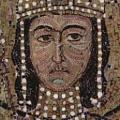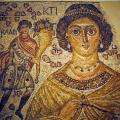314. Katerina Ierodiakonou on Byzantine Commentaries
Katerina Ierodiakonou discusses Byzantine commentators on Aristotle, including Michael of Ephesus.
Themes:
• K. Ierodiakonou (ed.), Byzantine Philosophy and its Ancient Sources (Oxford: 2002).
• K. Ierodiakonou, “Metaphysics in the Byzantine Tradition: Eustratios of Nicaea on Universals,” Quaestio 5 (2005), 67-82.
• K. Ierodiakonou, 2005, “Byzantine commentators on the epistemic status of ethics,” in P. Adamson, H. Baltussen and M.W.F. Stone (eds.), Philosophy, Science and Exegesis in Greek, Arabic, and Latin Commentaries (2005), 221–38.
• K. Ierodiakonou, “The Byzantine reception of Aristotle’s Categories,” Synthesis Philosophica 39 (2005), 7–31.
• K. Ierodiakonou, “John Italos on Universals,” Documenti e Studi Sulla Tradizione Filosofica Medievale 18 (2007), 231-47.
• K. Ierodiakonou, “Eustratius’ comments on Posterior Analytics II 19,” in F. de Haas, M. Leunissen and M. Martijn (eds.), Interpreting Aristotle’s Posterior Analytics in Late Antiquity and Beyond (Leiden: 2010), 55–71.
• K. Ierodiakonou, “Byzantium”, in R. Pasnau (ed.), The Cambridge History of Medieval Philosophy (Cambridge: 2010), 39–49.
• B. Bydén and K. Ierodiakonou (eds), The Many Faces of Byzantine Philosophy (Athens: 2012).
• K. Ierodiakonou, “A Logical Joust in Nikephoros Blemmydes’ Autobiography”, in J. L. Fink, H. Hansen and A. M. Mora-Márquez (eds.), Logic and Language in the Middle Ages (Leiden: 2013), 125–37.







Comments
Supervenience
c. 26:20 Katrina says on behalf of the author discussed that pleasure supervenes over eudaimonia and goes on to say that we find this also in Aristotle "but Aristotle doesn't give us a way to understand what he means by supervening." Peter c. 27:56 says of Plato and Aristotle that pleasure is not constitutive even partially of the best life but "comes along free...inevitably [necessarily?]."
Peter--are you trying to give an explanation of what Aristotle means? If so, I agree. But does Aristotle use a word at all close to the current use of 'supervenience'? In particular, what more or otherwise does the 'super' add?
In reply to Supervenience by Otter Bob
Supervenience
Yes, well spotted: I was trying quickly to translate "supervenience" into non-technical language, as I sometimes do in interviews. Actually philosophers use this term in a range of ways but the basic idea is that we have some phenomenon which is the primary explanation of something, and then something else comes "on top" (hence the "super"), the most common example being that consciousness or mental states generally may "supervene" on brain states: i.e. the brain state is what is "basically going on" causally speaking, but as a side-product or result, you get the mental state (which may or may not have further causal effects of its own).
Aristotle's Politics
The Nicomachean Ethics was mentioned a few times, but the Politics wasn't at all (I think).
Was it not part of the commentary tradition, even for the Aristotle completists ?
In reply to Aristotle's Politics by Graeme Andrews
The Politics
Good question. I believe there are only notes on the Politics by Michael of Ephesus but no full commentary - it also played very little role in the Arabic speaking world, interestingly. Obviously it was copied in Byzantium though, otherwise we wouldn't have it in Greek today.
Add new comment